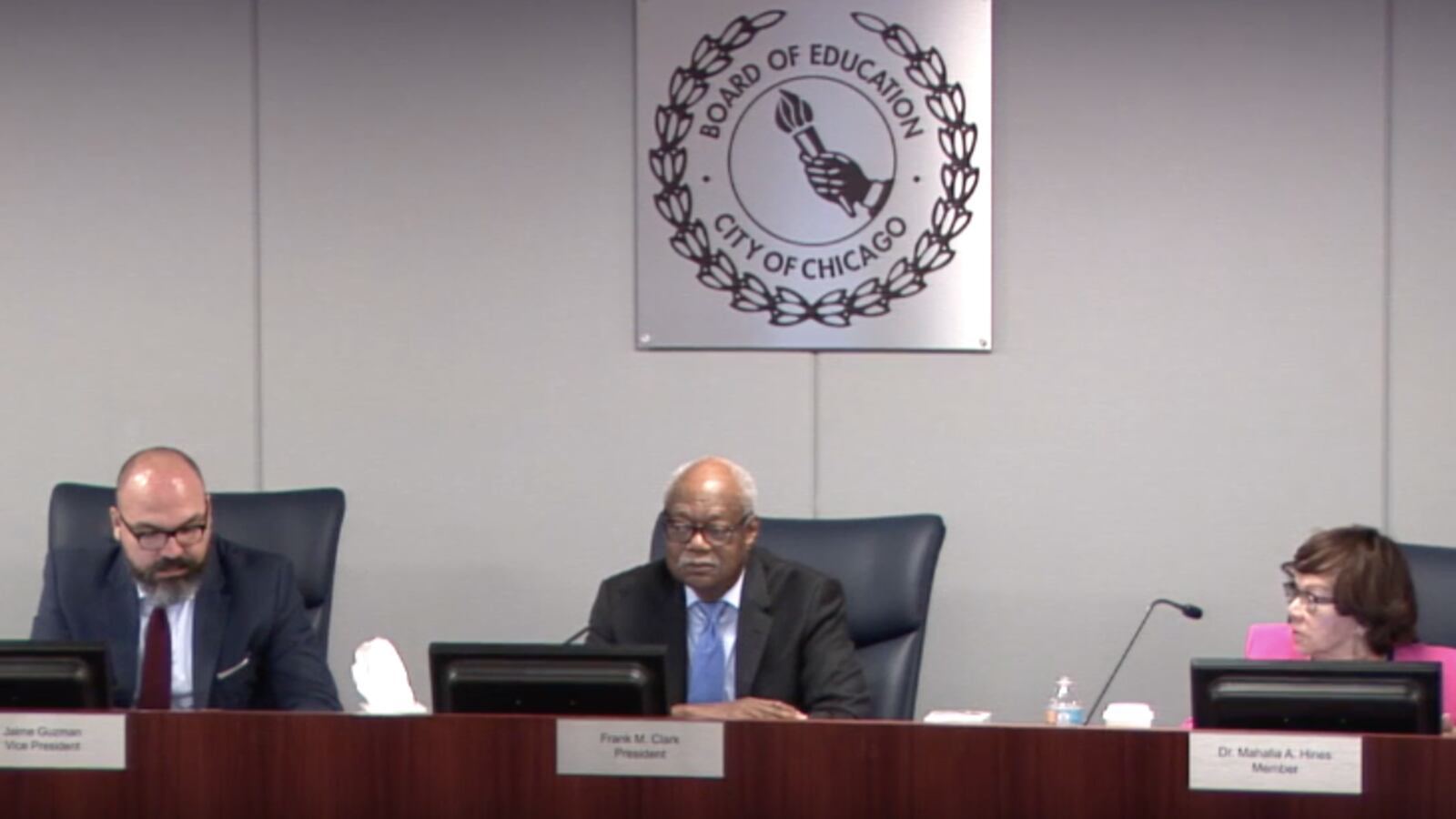With anxiety running high and a new mayor on the way, an array of Chicago charter school leaders appeared before the board of education Wednesday to press the school district about their needs — from new facilities to new school budgets and the release of millions in withheld funds.
Karen Ratliff, president of the board of Art in Motion charter high school, urged Chicago’s school board to clear one of its last hurdles for opening a fine arts school: approving a building in the South Shore community. Distinctive Schools, a Chicago group that manages four other charter schools in the city, will manage the school, and first secured a charter in 2017. The school is backed by the hip-hop artist Common, whose mother, Mahalia Hines, sits on the school board and abstained in voting on the proposal.
“We have found an ideal space that can grow with our student body over the next five years,” Ratliff said. “We look forward to hearing from you, hopefully, about an approved facility.”
Despite concerns expressed by teachers union President Jesse Sharkey about how the school would impact enrollment at Hirsch Metropolitan High School and other nearby campuses losing pupils, the board approved Art In Motion’s proposal.
It also gave the green light for KIPP to split grades K-4 from its KIPP Academy Chicago campus in Austin, which it shares with Nash Elementary School, and relocate to a nearby church building.
The school board voted in favor of Perspective Charter Schools’ plan to add 80 students at its Perspectives/IIT Math & Science Academy campus in Bronzeville, to serve students displaced by the closing of Young Women’s Leadership Charter School, another Bronzeville high school that is shuttering due to enrollment declines and financial problems.
But the most contentious issue brought up by charter schools at Wednesday’s board meeting involved charter school funding. Chicago Public Schools is withholding nearly $50 million in fourth-quarter funding from charter schools, and hasn’t released their school budgets for next year amid a standoff over how the city funds them. The dispute continues as the city awaits the inauguration next month of mayor-elect Lori Lightfoot, who pledged to enact a moratorium on new charter schools until she has time to study the issue and examine the district’s relationship with charters.
Related: Lori Lightfoot is Chicago’s next mayor — which means big changes are coming to schools
The district said that it had to withhold the funds to comply with the state funding range for charters, and is working to change that law in order to fund charters more equitably, comparable to district schools. But the district and charter schools disagree over the funding range and other issues and haven’t managed to bring a proposal to lawmakers.
Meanwhile, charter leaders said, their schools are hurting.
Greg White, president of Learn Charter School Network, which has seven schools on the city’s South and West sides, complained that his network’s fourth-quarter payment was cut by $2.5 million, causing his schools to “defer, delay and deny critical expenses,” including special education services.
Josh Marder, director at Erie Elementary Charter School in Humboldt Park, said it might have to cut back end-of year events and extracurricular programs.
Other charter school directors, principals and executives said that they might not be able to pay teachers, and that students might suffer a shortened school year and diminished programming.
Rather Stanton, CEO of Legal Prep Charter Academy in West Garfield Park, who said 28 percent of the charter’s final quarterly payment was withheld, called it, “a very deep cut, and if it doesn’t get solved it will be very challenging.” Legal Prep is Chicago’s only legal-themed high school.
Katherine Myers-Crum, director of Great Lakes Academy Charter School in South Chicago, stressed that 16 percent of district students attend charters — most black and Latino and from low-income households — and described the withheld funds as “a retroactive cut” to the funding for students.
“How do you budget that way? You can’t,” she said. “They should not be punished for choosing to go to a charter school.”
More than 20 charter school officials signed a letter shared with the board Wednesday calling for the funding to be restored.
School chief Janice Jackson acknowledged charter concerns, but fired back at what she characterized as “some things that have been conveniently left out of some of the talking points.”
She said the district had agreements with charters that stipulated how much money it is allowed to give them under the law.
“We want to restore the additional funds that everyone has talked about for the fourth-quarter payments, but legally the same statute they are fighting for precludes us from doing that,” she said. “So we want to have an honest conversation about how we can make the necessary adjustments so that we can adequately fund schools next year but also make sure we don’t disproportionately fund charter schools next year compared to our district schools.”
The roots of the problem go back to 2017, when state lawmakers passed school funding reform measures meant to more equitably fund schools. Those measures required districts to provide charters with 97 percent to 103 percent of what’s known as per capita tuition (the district’s total operational expenses divided by its number of students); previously, the range had been broader and had given districts more leeway to determine charter spending.
Chicago would like to revisit that law and has been working with charter leaders to do so, but it has not yet reached a resolution.
“This is very serious, we understand the consequences,” Jackson said. “But we hope that serves as a motivator for both of us to get a deal done, and we’re confident that will happen in the very near future.”

